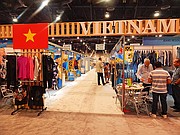TRADE SHOWS
Sourcing at MAGIC: Focus on Vietnam
At the vast Sourcing at MAGIC show, held at the Las Vegas Convention Center, it was around the world in more than 2,000 booths, not around the world in 80 days.
Companies from China, Pakistan, India, Bangladesh, Vietnam, Mexico, Peru, Guatemala, Colombia, Ethiopia, Kenya, Madagascar, Turkey and the United States were among the approximately 40 countries represented in the apparel side of the show in the North Hall and the footwear side of the show in the South Hall.
Every season, the Sourcing show shines a spotlight on a different country, which this August was Vietnam. The Vietnam Pavilion—with 40 booths—was trying to play up its vast array of factories, which have been growing rapidly over the past decade. Several big U.S. companies source there, with Vietnam now being the No. 2 supplier of apparel to the United States.
But it was China that dominated the show, representing some 70 percent of all the booths at the events, held Aug. 13–16.
The section for Chinese booths was so extensive that the apparel side was divided up by categories: Denim, Intimates, Bottoms, Dress It Up, Children and Outerwear.
This was the first time that Tontex Fashion, a 12-year-old company from Guangzhou, China, participated in the show. Even though 70 percent of its business is with U.S. companies, the Chinese venture wanted to develop more direct contacts with customers in the United States. Previous customers included Charlotte Russe, Pepe Jeans and Vanilla Star. “In the past, we have gotten our business from an agent,” said Sylvia Tan, the company’s sales manager. “We want to work directly with customers in the United States. That is our working target.”
Tontex, with two factories and 200 workers, specializes in making denim jeans and doing various washes and treatments to pants. Basic styles wholesale for $6 to $7, and pieces that have better fabric and more embroidery and washes go for $8 to $12.
In the first few days, Tan and her colleague had seen about 10 companies from California, New York and Canada. Some left sample inquiries for the company, whose minimums are 500 pieces.
Shishir Kapoor of MLK Exports is a consistent exhibitor at the show. His company, in Lucknow, India, started out nearly 13 years ago with only two sewing machines and a handful of workers. Now it has 250 machines and 400 full-time workers as well as employing 3,000 workers who hand embroider women’s clothing in their homes.
This is the only sourcing show that Kapoor and his brother Sharad attend. Last August, the two brothers landed an order for 35,000 pieces. “The last show was good, and this show is good, so far,” Shishir Kapoor said. “We think we have a different product. Few people do these handwork pieces.”
Most of MLK Exports’ styles are white tops and dresses accented with white embroidery as well as other vividly colored embroidery. Wholesale prices range from $6 to $50.
This was the second time that Wilson Avalos, president of The Common Link, was attending the show. Based in Los Angeles, The Common Link connects the apparel market with a global supply chain and helps clothing manufacturers develop their products. Avalos represents factories in Mexico, Guatemala, the United States and Brazil.
His goal has been to meet new customers. Last February, he made several contacts and one turned out to be a solid customer. He was hoping to do better at this second show. “It is all about showing up and having a presence,” he said. “People want to know you are a solid guy.”






















